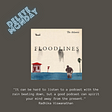A Dead Drug Kingpin! Sixty Feral Hippopotamuses! Has Any TV Show Ever Been More Must-See?
It’s a show about a band of rogue hippopotamuses who escaped from the lake of a deceased drug cartel kingpin and have gone feral in the rivers of Colombia.
Is there anything here that is less than fascinating? Is there any way you could not watch?
The Hunt for Escobar’s Hippos, which premieres Wednesday at 8 p.m. ET on Smithsonian, begins with the fact that one of things the late Medellin Cartel drug boss Pablo Escobar bought with his blood-stained billions was exotic animals.
So he populated his drug-financed compound, Hacienda Napoles, with an array of illegally imported animals, including elephants, rhinos and hippos.
Think Michael Jackson’s Neverland, only bigger, less legal, open to the public and built in large measure on the bodies of the thousands of innocent people who died in the Colombian drug wars of the 1980s and 1990s.
Escobar himself was eventually killed as well, in 1993, and one of the details he left for others to resolve, besides who would become the new cocaine billionaire, was the fate of all those animals.
Some died. Some were transferred to zoos. But the four hippos, who lived in a couple of Escobar’s man-made lakes, presented both a trickier and a less tricky dilemma.
They were self-sustaining, hanging around in the lake by day and leaving by night to forage the lush local grasslands.
So the Colombian government, which took over the compound, did nothing. But the hippos didn’t. They started breeding. And they started wandering further and further from the lake on their night missions.
Soon a new generation of male hippos started coming to maturity, at which time the older generation of males, in keeping with long-standing hippo tradition, chased them out of town.
So the new generation shrugged and wandered 30 or 40 miles to the nearest river, where they started their own colony.
It’s kind of cool in an abstract sense, and most of the Colombia people agree. They like having the big old critters around, so they pressured the government into passing legislation making it illegal to kill hippos.
Scientists and wildlife biologists see it a little differently. They see hippos, correctly, as the largest invasive non-native species on the planet. They see hippos already affecting the balance of nature. Their presence, plus their droppings, has already chased manatees and most turtles out of the river where the new colony has set up shop.
There is also concern for the safety of humans. In Africa, hippos kill more people every year than lions or crocodiles, which is odd given the reputation of lions and crocodiles and the fact that hippos are vegetarians.
Still, they’re big and fast-moving and apparently fearless. Some of the footage here shows a hippo trotting down the middle of the main street in a nearby village.
The Hunt for Escobar’s Hippos works hard to pump up the menace aspect, with ominous music and repeated reminders about the size of hippo mouths and teeth.
It’s also true, however, that so far no one has been harmed by a Colombian hippo, and while the population has been growing unchecked — no predators here — the estimate is that right now there are about 60 feral hippos. That’s a big increase from four, but a little short of an infestation.
The featured human players in The Hunt for Escobar’s Hippos, wildlife vet Dr. Gina Serna, and a wildlife relocation specialist from South Africa, say their concern is more long-term. If hippos continue to multiply unchecked, they fear there could be human as well as ecological consequences.
With culling not an option and with hippos being hard to physically contain, they turn toward the risky and difficult strategy of sterilization — which involves trapping the hippos one by one, sedating them and performing the operation.
As a sort of poignant footnote here, Gina Serna grew up in Medellin and her father was killed in Escobar’s drug wars. So the hippo mission provides a bizarre coda for her own story.
But the casual American viewer, who doesn’t face the possibility of a hippo wandering through his or her backyard, has the luxury of seeing the current situation as simply riveting.
And by the way, the plural of hippopotamus, even when the number gets up to 60, can be either hippopotamuses or hippopotami.






